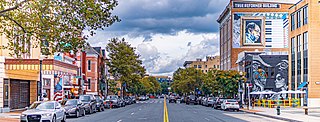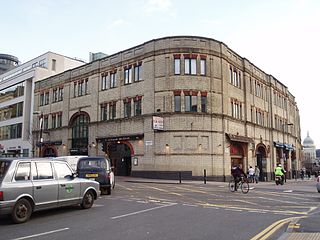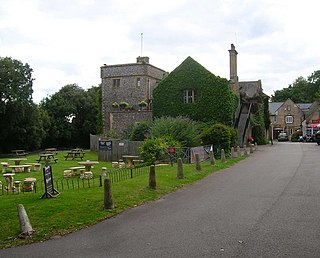
Disco is a genre of dance music and a subculture that emerged in the 1970s from the United States' urban nightlife scene. Its sound is typified by four-on-the-floor beats, syncopated basslines, string sections, brass and horns, electric piano, synthesizers, and electric rhythm guitars.
House is a genre of electronic dance music characterized by a repetitive four-on-the-floor beat and a typical tempo of 120-130 beats per minute as a re-emergence of 1970's disco. It was created by DJs and music producers from Chicago's underground club culture and evolved slowly in the early/mid 1980s, and as DJs began altering disco songs to give them a more mechanical beat. By early 1988, House became mainstream and supplanted the typical 80s music beat.

A rave is a dance party at a warehouse, club, or other public or private venue, typically featuring performances by DJs playing electronic dance music. The style is most associated with the early 1990s dance music scene when DJs played at illegal events in musical styles dominated by electronic dance music from a wide range of sub-genres, including drum and bass, dubstep, trap, break, happy hardcore, trance, techno, hardcore, house, and alternative dance. Occasionally live musicians have been known to perform at raves, in addition to other types of performance artists such as go-go dancers and fire dancers. The music is amplified with a large, powerful sound reinforcement system, typically with large subwoofers to produce a deep bass sound. The music is often accompanied by laser light shows, projected coloured images, visual effects and fog machines.

Lawrence Philpot, known as Larry Levan, was an American DJ best known for his decade-long residency at the New York City night club Paradise Garage, which has been described as the prototype of the modern dance club. He developed a cult following who referred to his sets as "Saturday Mass". Influential post-disco DJ François Kevorkian credits Levan with introducing the dub aesthetic into dance music. Along with Kevorkian, Levan experimented with drum machines and synthesizers in his productions and live sets, ushering in an electronic, post-disco sound that presaged the ascendence of house music. He DJ'd at Club Zanzibar in the 1980s as well, home to the Jersey Sound brand of deep house or garage house.

Washington, D.C., has been home to many prominent musicians and is particularly known for the musical genres of Jazz, Rhythm & Blues, bluegrass, punk rock and its locally-developed descendants hardcore and emo, and a local funk genre called go-go. The first major musical figure from District of Columbia was John Philip Sousa, a military brass band composer. Later figures include jazz musicians, such as Duke Ellington, Charlie Rouse, Buck Hill, Ron Holloway, Davey Yarborough, Michael A. Thomas, Butch Warren, and DeAndrey Howard; soul musicians, including Billy Stewart, The Unifics, The Moments, Ray, Goodman & Brown, Van McCoy, The Presidents, The Choice Four, Vernon Burch, guitarist Charles Pitts, and Sir Joe Quarterman & Free Soul.

Paradise Garage, also known as "the Garage" or the "Gay-rage", was a New York City discotheque notable in the history of dance and pop music, as well as LGBT and nightclub cultures. The 10,000 square feet (930 m2) club was founded by sole proprietor Michael Brody, and occupied a building formerly located at 84 King Street in the SoHo neighborhood. It operated from 1977 to 1987 and featured resident DJ Larry Levan.

The Turnmills building was a warehouse originally on the corner of Turnmill Street and Clerkenwell Road in the London Borough of Islington. It became a bar in the 1980s, then a nightclub. The club closed in 2008 and the building was later demolished, replaced with an office building.

Rock City is a music venue and nightclub located in Nottingham, England. It is owned by venue operator and concert promoter DHP Family.
Electronic dance music (EDM) is a broad range of percussive electronic music genres originally made for nightclubs, raves, and festivals. It is generally produced for playback by DJs who create seamless selections of tracks, called a DJ mix, by segueing from one recording to another. EDM producers also perform their music live in a concert or festival setting in what is sometimes called a live PA. Since its inception EDM has expanded to include a wide range of subgenres.
The Zap was a beach-front nightclub and performance arts venue, in Brighton, England that became known in the late 1980s and early 1990s particularly for its acid house nights. It has been described as an "influential ... club which pulled together many of the underground strands of visual art, fashion, music, design, comedy, cabaret and theatre which were circling at the time".

Tunnel was a nightclub located at 220 Twelfth Avenue, in the Chelsea neighborhood of Manhattan, New York City. It operated from 1986 to 2001.

Sterns was a nightclub located at Highdown Towers on Highdown Hill in Worthing, West Sussex. It was situated off the A259 road just north of Ferring on the South Downs. It became known as a major centre of UK rave culture in the south of England during the late 1980s and early 1990s. It was a rare example of an early UK club boasting 4 separate rooms with DJs playing house, breakbeat hardcore, jungle music, techno, progressive house and hard house.
Sir Henry's was a bar and nightclub on South Main Street in Cork, Ireland. It was founded by Jerry Lucey in 1978. The name was derived from Henry O'Shea, a baker and building owner in the South Main Street area of Cork city. The club was known for its house, trance, R&B, hip hop and regular live rock concerts. Gigs held there included a number by The Golden Horde, Toasted Heretic, Sonic Youth with support band Nirvana, Therapy?, The Wedding Present and The Fall.
Shelley's Laserdome was a night club in Longton, Stoke-on-Trent, Staffordshire, England. It was at the heart of the house and rave scene in the early 1990s, helping to launch the career of DJ Sasha and featuring regular appearances from Carl Cox. It was eventually shut down by Staffordshire Police.
The City Gardens was a nightclub located at 1701 Calhoun Street in Trenton, New Jersey. It opened in 1979 and closed in 2001.
Techno is a genre of electronic dance music (EDM) which is generally produced for use in a continuous DJ set, with tempo often varying between 120 and 150 beats per minute (bpm). The central rhythm is typically in common time (4/4) and often characterized by a repetitive four on the floor beat. Artists may use electronic instruments such as drum machines, sequencers, and synthesizers, as well as digital audio workstations. Drum machines from the 1980s such as Roland's TR-808 and TR-909 are highly prized, and software emulations of such retro instruments are popular.
Club Glow is the longest running electronic music event promoter on the East Coast and venue owner based in Washington, DC. Established in 1999, they currently operate venues Echostage and Soundcheck and host numerous large-scale events and music festivals at the DC Armory and RFK Stadium, including Project GLOW and Moonrise Music Festival. Club Glow regularly brings top international talent to Echostage, and in 2021 the venue obtained the first place in the world by DJ Magazine’s "Top 100 Clubs," and has been voted as “the best electronic music venue in North America” since 2017. Club Glow became a subsidiary of Insomniac Events in 2020 and the creative partnership has helped the company expand throughout the East Coast and beyond.
UK garage, abbreviated as UKG, is a genre of electronic dance music which originated in England in the early to mid-1990s. The genre was most clearly inspired by garage house, but also incorporates elements from dance-pop, R&B, and jungle. It is defined by percussive, shuffled rhythms with syncopated hi-hats, cymbals, and snares, and may include either 4/4 house kick patterns or more irregular "2-step" rhythms. Garage tracks also commonly feature 'chopped up' and time-stretched or pitch-shifted vocal samples complementing the underlying rhythmic structure at a tempo usually around 130 BPM.

DJing is the act of playing existing recorded music for a live audience.
23 Hop was a warehouse event space in Toronto, Ontario, Canada. It was an early venue for electronic music and a venue for raves. It was located at 318 Richmond Street West in the city's former Garment District which had recently become re-zoned into the city's Entertainment District.










